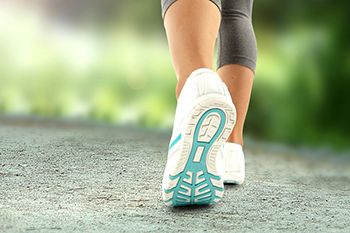
Walking and running shoes are designed with distinct features to accommodate the different needs of each activity. Walking shoes typically offer more flexibility and cushioning in the heel and arch to support the rolling motion of the foot during walking. They often have a more rigid sole to provide stability and promote a natural gait. Conversely, running shoes feature more shock absorption and cushioning in the heel and forefoot to handle the higher impact and repetitive stress of running. They are designed with more advanced shock-absorbing materials and often have a curved sole to enhance propulsion and forward motion. While both types of shoes aim to provide comfort and support, choosing the right shoe for your activity can help prevent injuries and improve performance. Foot injuries may happen from wearing the wrong type of shoe for your desired form of exercise, and can be treated by a podiatrist. If this applies to you, it is suggested that you contact this type of doctor who can offer treatment solutions, in addition to guiding you on choosing the right type of running or walking shoe.
For more information about walking shoes versus running shoes, consult with Charles Passet, DPM from Forest Hills. Our doctor can measure your feet to determine what your needs are and help you find an appropriate pair of footwear.
Foot Health: The Differences between Walking & Running Shoes
There are great ways to stay in shape: running and walking are two great exercises to a healthy lifestyle. It is important to know that running shoes and walking shoes are not interchangeable. There is a key difference on how the feet hit the ground when someone is running or walking. This is why one should be aware that a shoe is designed differently for each activity.
You may be asking yourself what the real differences are between walking and running shoes and the answers may shock you.
Differences
Walking doesn’t involve as much stress or impact on the feet as running does. However, this doesn’t mean that you should be any less prepared. When you’re walking, you land on your heels and have your foot roll forward. This rolling motion requires additional support to the feet.
Flexibility – Walking shoes are designed to have soft, flexible soles. This allows the walker to push off easily with each step.
If you have any questions, please feel free to contact our office located in Forest Hills, NY . We offer the newest diagnostic and treatment technologies for all your foot care needs.

